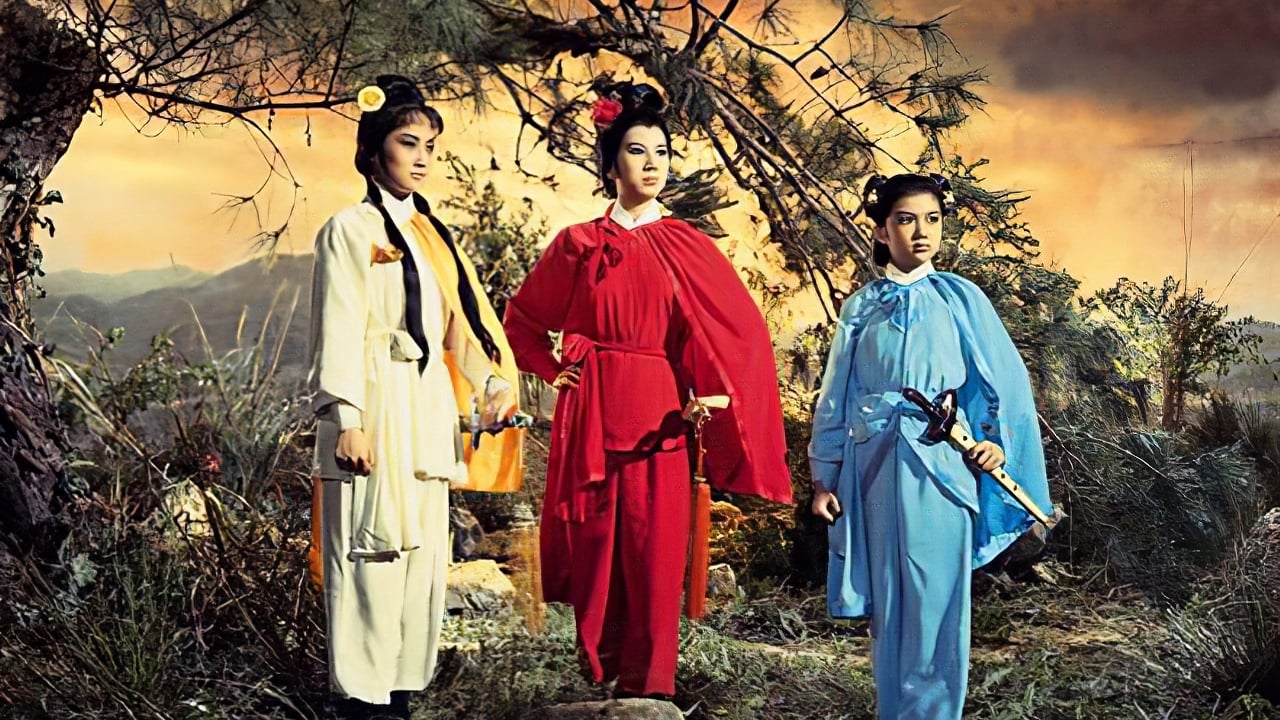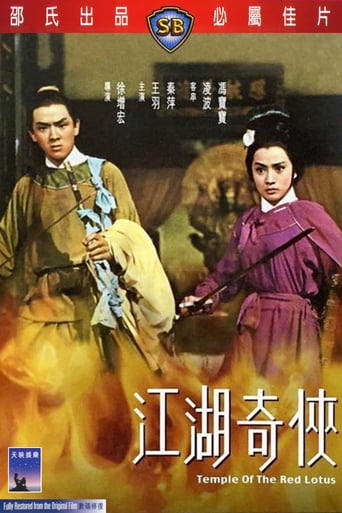



This is How Movies Should Be Made
Terrible acting, screenplay and direction.
Good start, but then it gets ruined
The thing I enjoyed most about the film is the fact that it doesn't shy away from being a super-sized-cliche;
View MoreThe saving grace of many martial arts movies are the dust-ups at the very end (THE BUDDHIST FIST springs to mind); TEMPLE OF THE RED LOTUS isn't one of those kind of movies. It's long-winded in the extreme and even sets up a sequel without really reaching its own climax (frustrating, indeed). In that respect, it reminds me of a well-made but ultimately disappointing Lo Wei movie, THE BLACK BUTTERFLY (though the interplay between the characters in THE BLACK BUTTERFLY is much more interesting). Wang Yu as "Little Wu" pretty much talks his way out of trouble throughout the movie (and this is especially annoying when he and the lovely Miss Chin must TALK their way past the assorted female members of the Jin Castle clan: they must ask for permission to leave from everyone from a young girl to an elderly grandmother and it's a time-consuming and VERY uninteresting sequence; Wang Yu DOES go on...). Feng Tien, Lo Lieh and Ku Feng are (as ever) solid villains all, but it's just not enough to make this one a must-see.
View MoreTEMPLE OF THE RED LOTUS (1965) is notable for being the first color swordplay film from Hong Kong's Shaw Bros. studio with an emphasis on martial arts. It's a fairly straightforward costume adventure drama about the ongoing battle between a righteous martial arts clan and one devoted to banditry. Shot in widescreen, with a mix of studio sets and picturesque outdoor locations, it's beautiful to behold, especially on the DVD edition from Celestial Pictures released as part of its package of restored, remastered Shaw Bros. titles. It was followed by a sequel, TWIN SWORDS (1965), which is also reviewed on this site, but which is not listed on Celestial's 2004 release slate. (Also missing from the slate is the third film in the series, THE SWORD AND THE LUTE.) Since the sequel is so much more incident- and action-packed, TEMPLE seems kind of naked without it, just as TWIN SWORDS would have benefited from a viewing of TEMPLE beforehand to fully appreciate it. The success of TEMPLE and its follow-ups meant the emergence of the martial arts film as a viable genre for the studio's active production line, leading directly to the works of notable kung fu directors Chang Cheh and Lau Kar Leung, among many others.Jimmy Wang Yu (ONE-ARMED SWORDSMAN) appears in one of his earliest starring roles as a young swordsman who visits the Jin Clan at their castle in Dragon Valley for the first time in ten years in order to learn new skills and marry his betrothed, Lianzhu (Chin Ping), granddaughter of Clan leader Dragon Jin (Tien Feng). A misunderstanding over the clan's activities arises from witnessing a raid by the family on disguised members of the corrupt Red Lotus Clan in the opening scene, prompting "Little Wu" (Wang Yu) to try to leave the family compound and take his bride with him, in order to continue his own mission of finding his parents' killers. The family objects, in its own characteristic fashion, while the Red Lotus bandits stir up more trouble, including taking over a temple and disguising themselves as monks and nuns.There's a long, talky middle portion that is tough going for a while, but there are spectacular action scenes at the beginning and end of the 90-minute production. The martial arts combat is not as sophisticated as it would be in the studio's later films and consists mostly of constant sword-swinging and slashing and dart-throwing, but remains pretty exciting and is a little bloody in parts. There are some brief training scenes. The fight choreography would be greatly improved in the sequel.The women play an important role in the Jin Clan's activities and participate equally in the fighting (but especially in the sequel). There's an interesting lone female warrior identified in the subtitles as "Red Lady," but more colorfully labeled "Scarlet Maid" in the tape edition of TWIN SWORDS. Played by Shaw Bros. superstar Ivy Ling Po and dressed all in red, she pops up at crucial moments to intervene on behalf of the hero for reasons not yet disclosed. She cuts a striking figure and makes one wish Shaw Bros. had made a series of films showcasing this character exclusively. (The character, or one very much like her, was featured in silent Chinese movie serials.) Also in the cast is child star Petrina Fung Bo-bo, who plays the youngest member of the Jin Clan and lends the film an unmistakable quotient of adorability. She looks a little older in the sequel, wherein she gets to wield the lethal "Iron-cutting Sword." Other key Shaw Bros. actors in the cast are Tien Feng, Ku Feng, Lo Lieh, Feng I, and a young Wu Ma.Fans of Wang Yu's hard-edged later works, e.g. ONE-ARMED SWORDSMAN, Chinese BOXER, ONE-ARMED BOXER and MASTER OF THE FLYING GUILLOTINE, may be surprised at how young, wide-eyed and cleancut he appears in his role here as a martial arts novice. He's nowhere near the brooding tough guy most kung fu fans know and love. He gets quite emotional in the sequel. The petite Chin Ping, as Wu's bride, may not make the most convincing swordswoman, but she's beautiful, sincere and spirited and is gorgeously costumed throughout. There is a traditional Chinese music score, with a couple of choral narrative songs on the soundtrack very late in the film. The opening credits feature some striking painted illustrations as backdrops.ADDENDUM: (9/26/07) Since I wrote the above review, both of the sequels, TWIN SWORDS and THE SWORD AND THE LUTE, have come out on restored/remastered Region 3 DVDs from Celestial Pictures. The entire trilogy can now be viewed in high-quality editions in their proper order.
View More